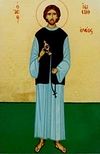

| Previous day | Next day |
| Old Style
February 4
|
Saturday |
New Style
February 17
|
| Cheese-fare Week—no meat; fish and dairy allowed. Tone 3. | Cheese-fare Week—no meat.
|
![]() St. Isidore of Pelusium, monk (ca. 436-440).
St. Isidore of Pelusium, monk (ca. 436-440). ![]() St. George, prince of Vladimir (1238).
St. George, prince of Vladimir (1238). ![]() St. Cyril, founder of New Lake Monastery (Novgorod) (1532).
St. Cyril, founder of New Lake Monastery (Novgorod) (1532).
Martyrs Jadorus and Isidore, who suffered under Decius (3rd c.). Hieromartyr Abramius, bishop of Arbela in Assyria (ca. 344-347). St. Nicholas the Confessor, abbot, of the Studion (868). Sts. Abraham and Coprius, founders of Pechenga Monastery (Vologda) (15th c.).
New Hieromartyr Methodius (Krasnoperov), bishop of Petropavlovsk (1921). New Hieromartyrs Theodosius (Bobkov), hieromonk of the Chudov Monastery (Moscow), Nicholas Kandaurov, archpriest (Moscow), Boris Nazarov, archpriest, of Protasievo (Verey), Alexander Pokrovsky, archpriest, of Mineyevo (Moscow), Alexander Sokolov, archpriest, of Paveltsovo (Moscow), Peter Sokolov, archpriest, of Klin (Moscow), John Tikhomirov, archpriest, of Petrovskoye (Moscow), and Nicholas Pospelov, priest, of Bylovo (Podolsk) (1938). New Martyr Raphaela, schemanun, of Moscow (1938).
Hieromartyr Phileas, bishop of Thmuis, and Martyr Philoromus the Magistrate (ca. 303). St. John of Irenopolis (ca. 325). St. Evagrius, fellow-ascetic of St. Shio of Mgvime, Georgia (6th c.). Hieromartyr Aldate of Gloucester (6th c.). New Martyr Joseph of Aleppo in Syria (1686).
Repose of the royal recluse Nun Dosithea of Moscow (1810).
Thoughts for Each Day of the Year
According to the Daily Church Readings from the Word of God
By St. Theophan the Recluse

Saturday. [Rom. 14:19–23, 16:25–27; Matt. 6:1–13. For the Fathers—Gal. 5:22–6:2; Matt. 11:27–30][1]
They that are Christ’s have crucified the flesh with the affections and lusts (Gal. 5:24). Nowadays, this order of things has been perverted: people crucify the flesh, but not together with the affections and lusts—rather by means of affections and lusts. How people now torture their bodies with overeating, drunkenness, lustful deeds, dancing and merry-making! The most heartless master does not torture his lazy animal this way. If we were to give our flesh freedom and reason, its first voice would be against its mistress—the soul; it would say that the soul has unlawfully interfered in the flesh’s affairs, brought passions alien to it, and tortures it by carrying these passions out in the flesh. Our body’s needs are essentially simple and passionless. Look at the animals: they do not overeat, they do not sleep in excess, and having satisfied their fleshly needs at the given time, they remain calm for the entire year. Only the soul, which has forgotten its better inclinations, has by its intemperance developed out of the body’s basic needs a multitude of unnatural inclinations, which are unnatural for the body as well. It is necessary to crucify the flesh in every possible way, in order to cut the fleshly passions off from the soul which the latter has grafted onto itself. This can be done only in the reverse—that is, by not giving it enough of what is necessary, or by meeting its needs to a far lesser degree than what its nature demands.
[1] The Romans Bible verses indicated in English at the top of this entry are changed so that the texts match the Russian Bible (three of the verses which are in Chapter 14 of the Russian Bible are found in Chapter 16 in the KJV).
Articles
 Venerable Cyril the Abbot and Wonderworker of Novoezersk, NovgorodSaint Cyril of New Lake was born into a pious family. The Lord marked him as one of the chosen even before he was born. |
 Martyr JadorusSaint Jadorus suffered martyrdom with Saint Isidore (not Isidore of Pelusium) in the reign of Decius (249-251). |
 Hieromartyr Abramius the Bishop of Arbela in AssyriaThe Hieromartyr Abramius, Bishop of Arbela, suffered during a persecution against Christians in Persia under the emperor Sapor II. |
 Venerable Nicholas the Confessor the Abbot of StudionBecause of his life as a confessor and ascetic he received from God the gift of healing, which continued even after his repose in the year 868. |







